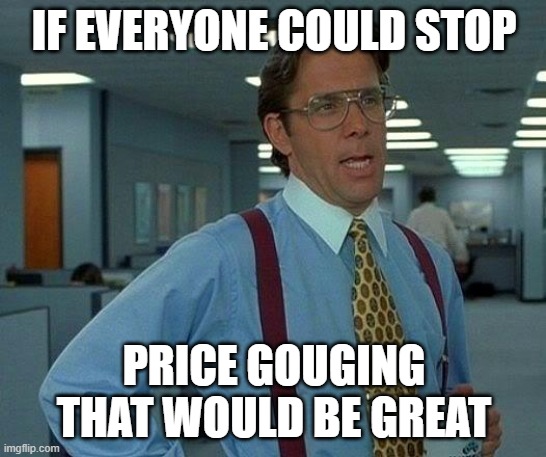Amazon has removed tens of thousands of deals from merchants that it said were being sold at prices that they consider to be price gouging. In one instance, Wired found a merchant selling face masks for as much as five times their normal price.
Amazon said that third-party sellers must follow its Fair Pricing Policy, which states companies can’t set a price “significantly higher” than other places or sell an item that “misleads customers.”
Price Gouging on Amazon
Price gouging on Amazon refers to any practices which violate Amazon’s Fair Pricing Policy.
“Amazon regularly monitors the prices of items on our marketplaces, including shipping costs, and compares them with other prices available to our customers. If we see pricing practices on a marketplace offer that harms customer trust, Amazon can remove the Buy Box, remove the offer, suspend the ship option, or, in serious or repeated cases, suspend or terminate selling privileges.”
Amazon states that pricing practices which harm trust include, but are not limited to,
- Setting a reference price on a product that misleads customers.
- Setting a price on a product or service that is significantly higher than recent prices offered on or off Amazon.
- Selling multiple units of a product for more per unit than that of a single unit of the same product.
- Setting a shipping fee on a product that is excessive. Amazon considers current public carrier rates, reasonable handling charges, as well as buyer perception when determining whether a shipping price violated our fair pricing policy.
Source: Amazon Marketplace Fair Pricing Policy
An Amazon spokesman told CNN Business, “There is no place for price gouging on Amazon. We are disappointed that bad actors are attempting to artificially raise prices on basic need products during a global health crisis and, in line with our long-standing policy, have recently blocked or removed tens of thousands of offers. We continue to actively monitor our store and remove offers that violate our policies.”
How to Avoid Price Gouging on Amazon
Amazon is cracking down on sellers who are price gouging by suspending listings and in some cases shutting Amazon stores down completely. Price gouging is unethical and illegal in some countries.
Is it really worth a short-term boost to profits if the risk is Amazon closes your account and you lose your business? You might even end up with 17,700 bottles of hand sanitizer and nowhere to sell them.
To avoid intentionally or unintentionally price gouging on Amazon, you need to set realistic min and max prices (also known as floor and ceiling prices). RepricerExpress requires you to set min and mix prices before you can start repricing in live mode.
If you’re selling any items that could be considered necessary for the public to use in dealing with COVID-19 such as medical supplies and cleaning products such as disinfectant then you need to pay close attention to this.
Devote time and effort to your max prices, just as you would with your min prices. Min prices will protect your profit margins and max prices will protect you from accusations of price gouging and possible Amazon account suspension or worse.

Amazon Fair Pricing Policy (Shipping)
Amazon’s policy also applies to shipping costs.
In an email to sellers, Amazon warned that shipping costs which harm customer trust, such as excessive shipping costs, are in violation of Amazon’s policies. Continued violation of these policies may lead to the removal of delivery options, and removal of offers.
All sellers should review their shipping prices and make sure you comply with Amazon’s policies. Amazon will notify you of any actions taken with details on ship options or offers impacted and how to reactivate your delivery options if you believe there has been an error.
Amazon Has to Ensure Listings Don’t Offer False Promises
According to reports by Reuters, Amazon has also removed more than a million items from sale on its marketplace for using false advertising over their effectiveness to cure or defend against the coronavirus (COVID-19).
In a statement, Amazon said that sellers are always required to “provide accurate information” on product pages and it will remove those that violate its policies.
As panic spreads, sales of masks which the Centers for Disease Control (CDC) has said don’t help have increased dramatically. Despite what the CDC advises, some people will still want masks. As a responsible retailer, Amazon has to ensure the listings don’t offer false promises. The news comes two days after Amazon confirmed two employees based in Milan, northern Italy, had tested positive for the coronavirus and are now in quarantine.
Amazon No Longer Accepting Applications to Sell COVID-19 Related Products
Amazon is also no longer accepting applications to sell products such as face masks. Some sellers have also received the below message from Amazon,
“You are receiving this message because you are currently selling, or have previously sold, products such as disposable face masks, hand sanitizers, disinfecting wipes/sprays, isopropyl alcohol, or related products. We have implemented more stringent requirements to sell these products in our store, and as a result, your offers have been removed. We are not accepting applications to sell these products at this time.”
Quick Tips for Amazon Sellers During Covid
If your inventory is unavailable or running low, pause any promotions you are running or reduce your ad spend and focus on increasing the profit margin of the inventory you do have. If supply isn’t an issue, you may look to increase ad spend and market share.
Sellers who rely on FBA might wish to explore other fulfillment options such as partnering with a third-party to store or ship inventory. But be ready to ship as soon as Amazon opens up shipments of non-essential goods.



